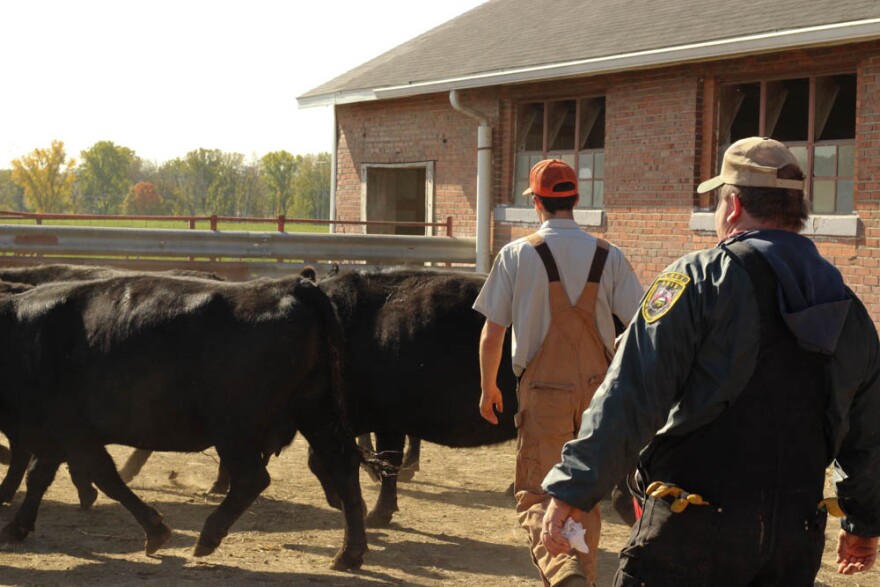After more than a hundred years of producing milk, meat and produce, this fall marks the last season for Ohio’s prison farms. State prison officials surprised many people earlier this year when they said they planned to shut down all 10 prison farms by the end of 2016. It might have been unexpected, but the decision follows similar moves in other states.
On an October Friday morning, about 300 people, mostly cattle ranchers, sit inside an old barn at the Mansfield Correctional Institution. They sip their coffee and watch as cattle are corralled into the center of the room.
Interested buyers raise their hand to start a storm of bidding by the auctioneer.
By the end of the day, the Ohio Department of Corrections sold the entire herd of more than 400 black Angus cattle. The haul: more than $700,000.

A history of farming
It will be a change for the inmates at Mansfield, who have worked and cared for cattle for the last 20 years. Like the other nine Ohio prison farms, this program was originally intended to train and rehabilitate prisoners.
On the Mansfield farm, the meat was used to Ohio prisoners, while select cuts were sold to profit the Department of Corrections.
There were five dairy farms, also run by inmates at Ohio prisons. At one time they supplied enough milk for the state's entire inmate population. Each year, acres of crops produced more than 100,000 pounds of produce that was donated to the Ohio Food Bank Association.
But in April, the Department of Corrections made an announcement that surprised many, including some state lawmakers: The farms would be phased out by the end of 2016.
Push back from union
Just outside the Mansfield prison, members of the Ohio Civil Service Employee Association gather on the side of the road to protest the cattle auction.
"This is the last auction for the whole set," says Chris Mabe, the local union chapter's president. He says about 50 workers will lose their jobs.
"So we're here today trying to make the public aware of what's going on and asking them to call the Governor’s office."

The Department of Corrections has said they plan to replace the farms with more modern job training, but Mabe argues the program wasn’t just about crops and cattle; inmates had to maintain the farm, the equipment, and a good work ethic.
"I mean there's a whole lot of things that are attached to farming itself that we believe are state of the art," says Mabe.
Mabe thinks these closures were an act of "corporate greed."
Last year, nearly $9 million was spent to upgrade the state's dairy and cattle farms. With their closing, millions more will have to spent to purchase milk from Ohio dairies.
Department of Corrections’ director Gary Mohr has repeatedly declined to say what kinds of programs will replace the farms. But he insists that the cost of operating the farms outweighed the benefit.
"No one can convince me that is was a negative," says Mohr. "I should have been thrown out of office for keeping farms, quite frankly, with the tax payers' dollars."

Prison farms closing around the country
The Ohio closures reflect a trend across the country. In recent years, both Indiana and New York closed their prison farms, citing financial reasons. According to the Bureau of Labor Statistics, by 2005 just 16 percent of prisons has farms .
That's compared to 30 percent in 2000.
Randolph Roth is a history professor at Ohio State. He says 80 years ago, most prisons had a farm. Back then farming was an economic way to feed inmates, and hard labor was seen as a method of rehabilitation.
"The idea was that people who committed crimes had habits of idleness; that they didn't have a work ethic or they didn't enjoy the joys of labor," says Roth.
Roth says today, that theory has been widely rejected, and changes in agriculture have made prison farms less profitable than they once were.
"Today it's so heavily mechanized that we know that a single farmer with the really expensive equipment can out-produce the hardest work that a person can do by hand," says Roth.

"A reason to want to get up in the morning"
It would seem there’s no room for farms in the modern criminal justice system. But for former inmate Steve Clark, working on the farm gave him a sense of purpose.
"It gave you a reason to want to get up in the morning," says Clark. "And that we were contributing something that could be useful."
In 2010, Clark was convicted of vehicular manslaughter and says he was fortunate to spend a year of his three year sentence on the farm at the Lebanon, Ohio prison.
Clark says for him and the other inmates to work outside was a privilege. Looking back, he says it's what kept him going.
"The farm was the hardest physical labor at the prison," says Roth. "It allowed men to get outside the walls mentally."
Clark says he’s upset that the program is closing, but mostly he sympathizes for those inmates who next year will have no choice but to remain inside the prison walls.





